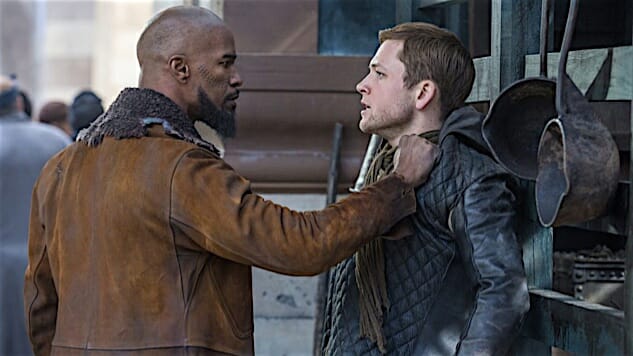Zombie Franchises: Robin Hood (and All Western Folklore)
The grandest stories. The laziest adaptations.

Zombie Franchises is a series of occasional articles in which Ken Lowe examines one of the shambling intellectual properties that plods onward under sheer force of box office money. Be wary of spoilers for movies that have been out for a while—or, in this case, the bedtime stories of an entire culture that have been told for even longer.

Quick, no googling: Do you remember anything about King Arthur: Legend of the Sword? What about that James Franco vehicle, Oz the Great and Powerful? How much do you think you’ll remember about the upcoming disaster, titled simply Robin Hood?
It’s easy to see where Hollywood gets its least interesting ideas: This toy line sold enough plastic junk to choke the Pacific, that old movie would play great in China with a younger actor and better CG, comics sure are hot right now. What’s so frustrating about the upcoming Robin Hood is that it’s the latest in a trend of taking some of Western culture’s most engaging ideas and then executing them in exactly the wrong way, with results so predictable you wonder if Hollywood executives truly lack pattern recognition.
I’ve already gone into why I think 1938’s The Adventures of Robin Hood was the last relevant word on British folklore’s Chaotic Good archer archetype (even though I am avowedly a fan of the Disney cartoon version). I now feel as if I need to explain why this upcoming Thanksgiving week train wreck is, totally predictably, about to occupy the same pile of forgotten flops as the duds I named above, the 2010 Russell Crowe adaptation, the 2004 Clive Owen adaptation of King Arthur, multiple Peter Pans (Peters Pan?), and what are sure to be any number of ill-advised attempts to rob the public domain that are even now working their way through Hollywood board rooms.
Zombie Franchises is usually here to chastise those on the foolish quest for more money at the expense of artistic dignity. But today, I am a man pleading: Please, if you’ve ever smiled up at a parent telling you a bedtime story or listened as an engaged teacher related a myth to you, please stop going to these movies. And if you’re one of the people responsible for making them, I implore you to stop.
Stories that belong to everybody, “intellectual property” that belongs to nobody
It’s easy enough to understand why this trend has taken hold, even if it fails to deliver time and time and time and time again. It costs a studio nothing to secure the rights to a story about Robin Hood, the green-clad outlaw having come to us from a time before intellectual property law and copyright infringement. That immediately means starting out from a lower overhead than other franchise hopefuls. It’s not a bad idea in theory if your intention is to count beans rather than craft a memorable film.
In practice, it means you are necessarily telling a story using characters everybody already knows. This presents a very real problem for script writers and directors, who are faced either with failing to live up to the Platonic ideal in our collective imagination or (very likely) failing to craft a fresh take that doesn’t seem totally silly. Consider King Arthur, the 2004 Clive Owen movie. The direction the creative team decided to go in sounds great on paper: What if we’re telling the King Arthur story, but placed into a strictly historical context, set amidst the backdrop of the decline of the Roman Empire? That accurately places the film into the historical milieu of the very earliest Arthur myths. (The film marketed itself as the “true story” of King Arthur, which is absolute bullshit.) Could be interesting, right?
It wasn’t. It was a movie that barely, in any way, resembles depictions of King Arthur we’ve seen before, and not in a new and exciting way. It’s all gritty battlefields, boring villains, and knights of the round table that completely fail to make any impression (except the big bald dude, who I think was Bors? Was he Bors?). We can’t get into how silly it is that all these men are from the same early-Iron Age culture when they have names like “Lancelot” and “Galahad.” The most we get of the steamy forbidden love between Guinevere and Lancelot is a baleful look before Lancelot dies, damn it. Arthur isn’t even “king” until the very end of the movie. There’s no epic tragedy, which is why you should be making an Arthur retelling.
It makes you wonder why these studios want to adapt these specific stories when they have no interest in the elements that make them memorable.
-

-

-

-

-

-

-

-

-

-

-

-

-

-

-

-

-

-

-

-

-

-

-

-

-

-

-

-

-

-

-

-

-

-

-

-

-

-

-

-








































